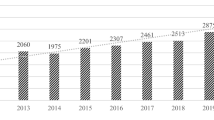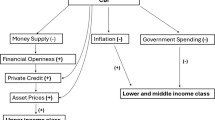Abstract
Global financial governance refers to the way in which global financial affairs are managed. As there is no global government, global financial governance typically involves a range of actors including states, as well as regional and international organizations aimed at negotiating responses to problems that affect more than one state or region, far from only providing the public good of financial stability through global economy integration and global financial legislation. In geopolitical context of the 21st century, emerging economies still have maintained a low profile in global financial governance, despite their growing economic power and the rhetoric of being a responsible great power, and there is little evidence that they will seek international leadership. Moreover, compared to the other emerging powers in the BRICS (Brazil, Russia, India, China and South Africa) group, China has under-participated in global governance in terms of contributing personnel, finance and ideas to major multilateral institutions and programs. It is really an interesting question in international economics and politics area. Firstly, this paper examines comparative data on the emerging economies countries’ participation in global financial governance and explains the reason why China has relatively low involvement in global financial governance. Secondly, this paper analyzes norms and legitimacy in global financial governance, and thus outlines the emerging economies constraints on public policy of global financial market integration in the light of the foregoing analysis of legitimacy, accountability and democracy. Finally, some global financial governance development strategy and possible policy solutions are discussed as well.
Similar content being viewed by others
References
STEPHEN M D. “Can you pass the salt?” The legitimacy of international institutions and indirect speech [J]. European Journal of International Relations, 2015, 21(4): 768–792.
MADHUR S. Asia’s role in twenty-first-century global economic governance [J]. International Affairs, 2012, 88(4): 817–833.
GRABEL I. Global financial governance and development finance in the wake of the 2008 financial crisis [J]. Feminist Economics, 2013, 19(3): 32–54.
HELD D, ROGER C, NAG E-M. Climate governance in the developing world [M]. Cambridge, UK Malden, Massachusetts: Polity Press, 2013.
BRUNNERMEIER M, CROCKETT A, GOODHART C, et al. The fundamental principles of financial regulation[R]. Geneva: International Centre for Monetary and Banking Studies, London: Centre for Economic Policy Research, 2009.
SUCHMAN M C. Managing legitimacy: Strategic and institutional approaches [J]. Academy of Management Review, 1995, 20(3): 571–610.
BUCHANAN A, KEOHANE R O. The legitimacy of global governance institutions [J]. Ethics and International Affairs, 2006, 20(4): 405–437.
STEPHEN M D, FOOT R, WALTER A, et al. States, norms and power: Emerging powers and global order [J]. Journal of International Studies, 2014, 42(3): 888–896.
Author information
Authors and Affiliations
Corresponding author
Rights and permissions
About this article
Cite this article
Li, Y., Wang, H. China and emerging economies in global financial governance: Legitimacy, accountability and democracy. J. Shanghai Jiaotong Univ. (Sci.) 21, 199–203 (2016). https://doi.org/10.1007/s12204-016-1712-5
Received:
Published:
Issue Date:
DOI: https://doi.org/10.1007/s12204-016-1712-5




